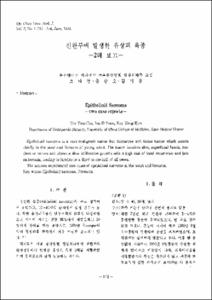한국산업은행의 투자에 관한 연구
- Alternative Title
- A Study on KDB's Investment
- Abstract
- 한국 자본주의 발전에 있어서 국가의 역할은 대단히 중요한 것이었다. 1960년대와 70년대에 있어서는 국가자본이 팽창하고 이것을 토대로 사적 자본을 지도하고 육성해왔다. 그러나 80년대에는 형성된 국가자본을 재벌에게 불하함으로써 사적 자본의 양적 질적 발전을 유도하였다. 이러한 국가와 재벌의 哺乳的 관계는 산업은행의 투자에서 잘 나타난다. 80년이전의 투자는 주로 주식투자에 집중되었다. 주식투자는 지분을 기준으로 하는 소유에 기초한 통제를 전제로 자본을 지배하는 방식이다. 그러나 80년대에 와서는 투자의 축이 사채인수로 전화하여 국가의 경제에 대한 개입이 비소유에 기초한 사적 자본에 대한 지원으로 개입양상의 변화를 보여준다. 사적 자본은 재벌을 중심으로 하는 독점자본을 의미한다. 이러한 국가개입의 형태변화는 국가의 위치가 사적 자본에 대하여 상대적 우위를 점차 상실하고 있으며 나아가 독점자본의 상대적 우위가 확립되는 과정으로 파악된다. 동시에 국가자본주의적 개입에서 국가독점적 개입으로의 변화과정을 의미하는 것이다.
State has played a major role in capitalist development in Korea. In the 1960's and 70', state capital had controlled and nourished private capital on its own expansion. But in the 1980, the enlarged state capital was distributed to chaebols. State also led development of private capital quantitively and qualitatively. Thus, it is easy to discover the nourishing relationship between state and chaebol.
KDB's investment before the 80' is mainly for stocks. By stock investment, KDB could control the capital in proportion to the holder's share. However in the eighties, the direction of investment has been changed to debenture underwritting. State controls private capital indirectly rather than directly. Private capital is monopolistic and mostly occupied by chaebol. We can interprete the change as follows: state loses its dominance over private capital increasingly and the relative dominance of monopoly capital is established step by step. It also means the transformation from state capitalist intervention to state monopoly capitalist intervention.
State has played a major role in capitalist development in Korea. In the 1960's and 70', state capital had controlled and nourished private capital on its own expansion. But in the 1980, the enlarged state capital was distributed to chaebols. State also led development of private capital quantitively and qualitatively. Thus, it is easy to discover the nourishing relationship between state and chaebol.
KDB's investment before the 80' is mainly for stocks. By stock investment, KDB could control the capital in proportion to the holder's share. However in the eighties, the direction of investment has been changed to debenture underwritting. State controls private capital indirectly rather than directly. Private capital is monopolistic and mostly occupied by chaebol. We can interprete the change as follows: state loses its dominance over private capital increasingly and the relative dominance of monopoly capital is established step by step. It also means the transformation from state capitalist intervention to state monopoly capitalist intervention.
- Issued Date
- 1992
- Type
- Research Laboratory
- Alternative Author(s)
- Kim, Seung-Seock
- Publisher
- 사회과학논집
- Language
- kor
- Rights
- 울산대학교 저작물은 저작권에 의해 보호받습니다.
- Citation Volume
- 2
- Citation Number
- 1
- Citation Start Page
- 99
- Citation End Page
- 117
- Appears in Collections:
- Research Laboratory > Journal of social science
- 파일 목록
-
-
Download
 000002024712.pdf
기타 데이터 / 335.54 kB / Adobe PDF
000002024712.pdf
기타 데이터 / 335.54 kB / Adobe PDF
-
Items in Repository are protected by copyright, with all rights reserved, unless otherwise indicated.